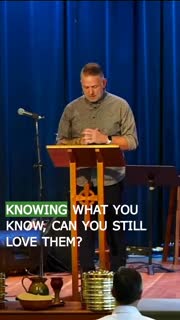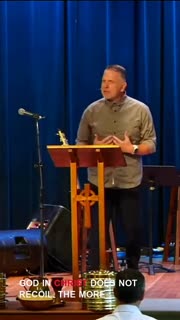Knowing and Loving: Lessons from Jonah's Journey
Devotional
Sermon Summary
Bible Study Guide
Sermon Clips
1. "What I want you to hear is that in the Minor Prophets, God is inviting us into this life with him. And he's displaying to us both his tender mercy and his severe mercy so that we might be tethered to him. And so I want to ask you this question and just give you a space to consider it before we read the text. And the question is, can you know and still love?" [45:14] (32 seconds)
2. "Jonah is a character like Will. What we discover in this short prophetic book is that the more Jonah knows about the Ninevites, the less he loves them. And the more that he knows about God, his covenant Lord, the less he loves him. And consequently this morning, by the way, perhaps the more we learn about Jonah, the less we tend to love him." [51:22] (29 seconds)
3. "Have you ever been nudged to do something nice, kind, to someone who hasn't always been nice or kind to you? And maybe, maybe more specifically, a parent who has misjudged you, manipulated you, hurt you, then made you feel like you are the reason things are so broken? And in that, you feel called to move towards them with, with grace and empathy, with the hope that they might respond in a different way." [52:16] (28 seconds)
4. "The more you know about your spouse, can you still love them? Parents, there's years together, years apart. Knowing what you know, can you still love them? Family life and struggles. After my mom's death, I've been wrestling with my story and my family. Telling the truth and also at the same time honoring them. And it is a painful work." [59:10] (43 seconds)
5. "Knowing what you know, can you still love them? When your neighbor's dog wakes you up in the middle of the night and the church and the people in it, they do things you might not like or want. They may fail to meet your expectations. They will fail. They will fail to meet your expectations. And you will fail to meet theirs." [59:37] (26 seconds)
6. "The more Jonah knows, the less he loves. And I think the question is, is this book a book about Jonah, or is it a book about God? Is it a story of us or is it a story of God? Because I think at the baseline of Jonah, the more God knows, the more God loves." [01:04:16] (22 seconds)
7. "The more He knows, the more He loves. Maybe you too are like Jonah. Maybe the more you know about God, the less you're prone to love Him. Maybe from the circumstances of your life, the loss you've suffered, knowing that God is sovereign and providential has caused you in that loss great pain. Maybe you don't like that God is a God of grace, slow to anger, rich in love." [01:06:35] (34 seconds)
8. "God in Christ does not recoil. The more He knows, the more He loves. He enters in. He acts. He knows. He does. He puts on our suffering, our awkwardness. He puts on our stupid, ridiculous soul toupees, our shame, our curse. He puts it all on Him." [01:08:42] (20 seconds)
9. "The Lord knows our hearts. He knows it's sick. He knows it's deceitful. He knows all the private thoughts that we have. He knows how we seek exaltation for men. He knows how self-righteous we are. And yet, He doesn't abandon us. He knows us. And still moves in to help us and save us." [01:09:35] (24 seconds)
10. "Will we move into Winston and the Triad together as a community, as individuals that make up this community, pressing in to know them, their stories, their shames, their soul-tapes, and in that knowing, would we love?" [01:16:26] (16 seconds)
Ask a question about this sermon
2. "Jonah is a character like Will. What we discover in this short prophetic book is that the more Jonah knows about the Ninevites, the less he loves them. And the more that he knows about God, his covenant Lord, the less he loves him. And consequently this morning, by the way, perhaps the more we learn about Jonah, the less we tend to love him." [51:22] (29 seconds)
3. "Have you ever been nudged to do something nice, kind, to someone who hasn't always been nice or kind to you? And maybe, maybe more specifically, a parent who has misjudged you, manipulated you, hurt you, then made you feel like you are the reason things are so broken? And in that, you feel called to move towards them with, with grace and empathy, with the hope that they might respond in a different way." [52:16] (28 seconds)
4. "The more you know about your spouse, can you still love them? Parents, there's years together, years apart. Knowing what you know, can you still love them? Family life and struggles. After my mom's death, I've been wrestling with my story and my family. Telling the truth and also at the same time honoring them. And it is a painful work." [59:10] (43 seconds)
5. "Knowing what you know, can you still love them? When your neighbor's dog wakes you up in the middle of the night and the church and the people in it, they do things you might not like or want. They may fail to meet your expectations. They will fail. They will fail to meet your expectations. And you will fail to meet theirs." [59:37] (26 seconds)
6. "The more Jonah knows, the less he loves. And I think the question is, is this book a book about Jonah, or is it a book about God? Is it a story of us or is it a story of God? Because I think at the baseline of Jonah, the more God knows, the more God loves." [01:04:16] (22 seconds)
7. "The more He knows, the more He loves. Maybe you too are like Jonah. Maybe the more you know about God, the less you're prone to love Him. Maybe from the circumstances of your life, the loss you've suffered, knowing that God is sovereign and providential has caused you in that loss great pain. Maybe you don't like that God is a God of grace, slow to anger, rich in love." [01:06:35] (34 seconds)
8. "God in Christ does not recoil. The more He knows, the more He loves. He enters in. He acts. He knows. He does. He puts on our suffering, our awkwardness. He puts on our stupid, ridiculous soul toupees, our shame, our curse. He puts it all on Him." [01:08:42] (20 seconds)
9. "The Lord knows our hearts. He knows it's sick. He knows it's deceitful. He knows all the private thoughts that we have. He knows how we seek exaltation for men. He knows how self-righteous we are. And yet, He doesn't abandon us. He knows us. And still moves in to help us and save us." [01:09:35] (24 seconds)
10. "Will we move into Winston and the Triad together as a community, as individuals that make up this community, pressing in to know them, their stories, their shames, their soul-tapes, and in that knowing, would we love?" [01:16:26] (16 seconds)










